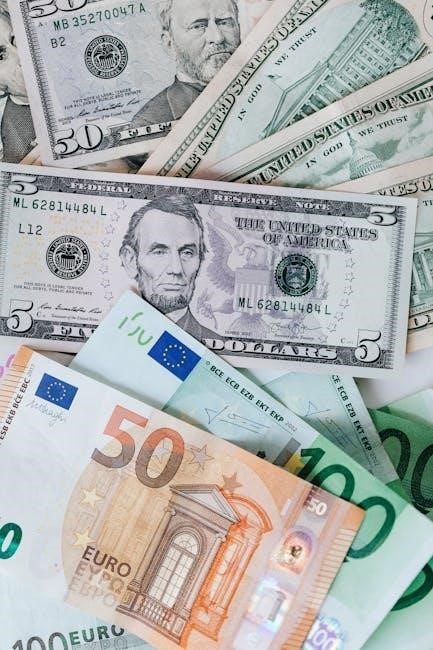Understanding guitar value is crucial for enthusiasts, collectors, and investors; The Official Vintage Guitar Price Guide and the Blue Book of Guitar Values provide authoritative pricing insights, helping determine the worth of acoustic, electric, and vintage instruments. These resources guide informed decisions for buyers, sellers, and collectors seeking accurate valuations in the dynamic guitar market.

Factors Influencing Guitar Value
Guitar value is shaped by make, model, condition, and rarity. These factors, along with historical significance and market demand, determine the worth of acoustic, electric, and vintage instruments in the market;

Make and Model
The brand and specific model significantly influence a guitar’s value. Renowned manufacturers like Gibson and Martin often command higher prices due to their reputation, craftsmanship, and historical significance. Certain models, such as the Gibson Les Paul or Martin D-28, are particularly sought after by collectors and musicians. The Blue Book of Guitar Values and the Official Vintage Guitar Price Guide provide detailed appraisals, noting that these iconic models have seen substantial appreciation over the years. For instance, vintage Gibson flat-top guitars have quadrupled in value since the early 1990s. The combination of brand prestige and model popularity creates a strong foundation for determining a guitar’s market worth, making these factors indispensable for buyers and sellers alike.
Condition
The condition of a guitar plays a pivotal role in determining its value. Guitars in pristine, original condition typically command the highest prices, while those with significant wear, repairs, or modifications may see their value diminished. Factors such as dents, scratches, fading, or electronic modifications can impact the appraisal. The Official Vintage Guitar Price Guide emphasizes that even minor damage or alterations can reduce a guitar’s worth by up to 50%. Collectors often seek instruments with original parts and minimal playwear, as these retain greater authenticity and desirability. Professional appraisals and detailed documentation are crucial for verifying a guitar’s condition, ensuring accurate valuations. Whether for sale or investment, understanding the condition’s influence is essential for making informed decisions in the guitar market.
Rarity
Rarity significantly impacts a guitar’s value, with limited production runs and exclusive models often commanding premium prices. The Blue Book of Guitar Values highlights that rare guitars, such as certain vintage Gibson and Martin models, can appreciate dramatically over time. For instance, the 1959 Gibson Les Paul Standard is highly sought after due to its limited numbers and historical significance. Additionally, rare finishes or unique custom orders can elevate a guitar’s value. The Reverb Price Guide notes that scarcity drives demand, making rare instruments valuable assets for collectors and investors. As such, verifying a guitar’s rarity through serial numbers and historical records is crucial for accurate valuation. Rare guitars are not only prized possessions but also smart investments, as their value tends to increase with time.

Pricing Resources
The Official Vintage Guitar Price Guide and Reverb Price Guide are essential tools for determining guitar values, offering comprehensive pricing data on vintage and modern instruments, amps, and effects.
Official Vintage Guitar Price Guide
The Official Vintage Guitar Price Guide is the industry’s leading reference for determining the value of vintage and collectible guitars, basses, amps, and effects. Compiled annually, it gathers input from 35 of the world’s foremost expert dealers, ensuring accurate and up-to-date pricing. The guide covers a wide range of instruments, including acoustic and electric guitars, mandolins, and banjos, making it a comprehensive resource for collectors and enthusiasts. It also features a useful directory of dealers, manufacturers, and repair services, adding practical value for those seeking professional assistance. The guide’s Guitar Index tracks the appreciation of specific models over time, helping investors and collectors make informed decisions. Available in both paperback and digital formats, the guide is a trusted tool for anyone looking to buy, sell, or understand the value of their instruments. Its detailed pricing data and historical insights make it indispensable in the guitar market.
Reverb Price Guide

The Reverb Price Guide is a dynamic and comprehensive resource for determining the value of musical instruments and gear. It aggregates data from Reverb’s vast marketplace, providing real-time insights into pricing trends for guitars, amps, effects, and more. Unlike static price guides, Reverb’s tool offers up-to-the-minute information, reflecting current market demand and sales data. This makes it an invaluable resource for buyers, sellers, and collectors seeking fair and competitive prices. The guide also includes detailed listings for vintage and rare instruments, helping enthusiasts identify rare finds and understand their worth. Additionally, Reverb’s FAQ section offers helpful tips for navigating the market, making it a go-to source for both beginners and seasoned professionals. Its emphasis on transparency and accuracy ensures that users can make informed decisions when buying or selling their gear. The guide is freely accessible online, further enhancing its utility for the music community.

Determining Guitar Value
Determining guitar value involves understanding market trends, condition, and rarity. Research tools like the Official Vintage Guitar Price Guide and Reverb Price Guide provide essential insights for accurate appraisals.

Research Methods
Researching guitar value involves using authoritative price guides, online marketplaces, and professional appraisals. The Official Vintage Guitar Price Guide and the Blue Book of Guitar Values are key resources, offering detailed pricing for various models. Online platforms like Reverb provide real-time market data, showing current listings and recent sales. Additionally, professional appraisers can assess an instrument’s condition, authenticity, and historical significance. Auction houses, such as Christie’s or specialized guitar auctions, often publish sale results, which can help estimate value. Collectors and enthusiasts also share insights in forums and communities, offering firsthand experiences and trends. By combining these methods, one can gain a comprehensive understanding of a guitar’s worth, ensuring informed decisions for buying, selling, or investing.
Professional Appraisal

A professional appraisal is a critical step in determining the value of a guitar, especially for rare or high-value instruments. Expert appraisers use their extensive knowledge to assess the guitar’s condition, authenticity, and historical significance. They often reference authoritative guides like the Official Vintage Guitar Price Guide and Reverb Price Guide to establish a baseline value. Appraisers also consider factors such as the instrument’s provenance, rarity, and demand in the current market. Their detailed reports provide an objective evaluation, which is essential for insurance purposes, estate planning, or selling the guitar. Professional appraisals can also uncover hidden details, such as unique modifications or historical connections, that significantly impact the guitar’s worth. This specialized expertise ensures that the appraisal is accurate, reliable, and tailored to the instrument’s specific characteristics.

Investing in Guitars
Guitars can offer high returns as investments, with vintage models often appreciating significantly. Researching rarity, condition, and historical significance is crucial for making informed decisions and maximizing potential gains.
Historical Appreciation

Historical appreciation plays a significant role in the value of guitars. Instruments associated with famous musicians or pivotal moments in music history often see substantial increases in worth. For instance, guitars used by legendary artists like John Lennon or Jimi Hendrix can become highly sought after, driving up their value. Additionally, limited edition models or those produced during specific historical periods, such as the 1950s and 1960s, are highly prized by collectors. The cultural and historical significance of these instruments contributes to their appreciation over time. Understanding this aspect is crucial for anyone looking to invest in guitars, as historical context can greatly influence market demand and, subsequently, the value of an instrument.
Investment Tips
Investing in guitars requires careful research and a strategic approach. Start by studying market trends using resources like the Official Vintage Guitar Price Guide and the Reverb Price Guide. These tools provide insights into historical pricing and current demand. Diversify your portfolio by investing in a mix of iconic models, limited editions, and rare instruments, as these tend to appreciate over time. Focus on guitars in excellent condition, as their value is more likely to increase. Avoid instruments with heavy modifications or damage, as this can significantly lower their worth. Additionally, consider the long-term storage and maintenance of your guitars to preserve their condition. Finally, seek advice from experienced dealers or appraisers to make informed decisions. With patience and the right strategy, guitars can be a rewarding and profitable investment.
Determining the value of a guitar is a complex process that involves understanding market trends, historical significance, and instrument condition. Resources like the Official Vintage Guitar Price Guide and the Reverb Price Guide provide essential insights for buyers, sellers, and collectors. By researching factors such as make, model, rarity, and condition, individuals can make informed decisions. Additionally, professional appraisals offer expert valuations for rare or unique instruments. For those looking to invest, guitars have shown significant historical appreciation, with vintage models often increasing in value over time. To maximize returns, focus on well-maintained, high-quality instruments with strong market demand. Whether you’re a seasoned collector or a new enthusiast, understanding guitar value is key to navigating this rewarding market. Use these guides and resources to make informed choices and enjoy the journey of guitar ownership and investment.
